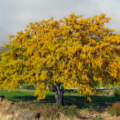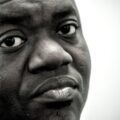Conversations: Loie Rawding and Lauren Connell Johnson

If you’re the kind of reader who relishes underlining favorite sentences and marking up the margins of your books, keep a pen handy while you read Loie Rawding’s debut novel, Tight Little Vocal Cords by KERNPUNKT Press. Laced with dreamy, surrealist imagery, Rawding’s novel is a hybrid of prose, poetry, and letters, inspired by the life and work of American modernist painter, Marsden Hartley.
Tight Little Vocal Cords opens with protagonist M’s birth in an island town off the coast of Maine, where “the ocean makes you work before you know that you are allowed to say no,” and an amusement park “seduces its crowds with… a rainbow of smashed light bulbs.” Readers follow M across the American West before embarking on a passenger ship to post-Great War Berlin. With points of view shifting between third, first, and third person plural, Tight Little Vocal Cords is a kaleidoscope of landscapes and lovers. The prose is melancholy, haunting and incredibly sexy at once.
At less than 150 pages, Tight Little Vocal Cords is slim, but don’t let the page count deceive you; this novel is filled with delectable writing you’ll want to sink your teeth into but not devour in one or two sittings. The pages want to be read slowly—you’ll find that sentences, scenes and chapters are so arresting, they’ll demand you read them at least twice. I reached out to Rawding for an interview about experimental writing, naturalism, crafting erotic scenes, writing gender fluid characters, and learning to trust one’s own literary instincts and sensibilities. Here are the highlights from our conversation.
—Lauren Connell Johnson
Lauren C. Johnson: How did Hartley’s way of looking at the world influence the way you approached and structured this novel?
Loie Rawding: The book began as a short story written for one of my MFA workshops [at the University of Colorado]. This professor assigned an exercise to write a piece in conversation with a work of visual art. As luck would have it, I was already in the habit of using other art forms to jump start my creative writing. I am a former student of dance, acting, and painting. For better or worse, I hold these mediums very close as I work through a piece of writing.
Hartley was already very much on my mind. He was a modernist painter who swam in the circles of Alfred Stieglitz and Gertrude Stein; a faithful disciple of Ralph Waldo Emerson and a Mainer, like me. But unlike his more famous friends, Hartley was stoic, quiet, and never rose to extreme fame in his own time. He was closeted gay, even though others around him lived more openly. He was a passionate and under-spoken wallflower, longing to be in the center of the ring. I connected to him and his paintings immediately.
Hartley moved through several different stages of painting, always expanding his own voice and vision. His most famous paintings were a result of falling madly in love with a German soldier, who died in World War I. The paintings became infamous, in large part, for his use of German military symbols as tribute to his fallen—and secret—lover. Americans were angry and resentful of Germany and the unspeakable violence of the war, and they took it out on this vulnerable artist who was trying to understand his own complicated grief. Hartley retreated back to Maine and into the natural world where he felt most safe.
I connect to his experience of being a witness to atrocity and having to decide what action I will take as a person of immense privilege. But I am also a woman who grew up at the poverty line, which has given me access to different kinds of language, to different ways of seeing, perhaps like Hartley.
LCJ: I imagine M might have viewed the world differently had he grown up in the desert community he later travels to rather than his harsh, coastal birthplace. How do you think your characters are influenced by landscape and biome?
LR: Absolutely—their bodies are a part of the landscape through which they move. For me, the environments that contain our bodies dictate, to a certain degree, what we are capable of.
My formative part of growth happened when my mother moved us to a remote island off the Southern coast, a very similar place to where M’s story begins. I’ve never paid special attention to my settings though recently I’ve been able to articulate that my sense of setting is embedded in how I build my characters. These two craft elements are so connected for me that they both rise from, and for, each other.
This got especially interesting for me as I pushed M through different landscapes, extreme in their own unique ways. I had such fun forcing M to evolve with each passing biome; with a generous touch of surrealism, his body literally changes form in response to what his lovers and the environment make space for.
LCJ: You give your readers a lot of information about setting in the vignette, “Dogtown”: “Laundry is done on Sunday afternoons on the island…Everyone stands out at the wash lines, blowing the sand off clothespins before fastening each sheet, every greasy pillowcase to the rope. Saturday nights demand a good washing of all these things.” How do you think ecosystems influence a community’s specific daily rhythms and rituals?
LR: In Dogtown, the island community that is M’s home, the ecosystem determines when people can do their work, when they can perform their domestic duties, and when they can play. There are still four distinct seasons in New England. Where and when the sun sets plays a major role in not just people’s lives, but their mental health and by extension their relationships. Many businesses shut down all winter, and thus are dependent on a successful summer to survive the hibernation months.
This is still largely the case where I grew up, but I’ve now lived in what feels like a million different places and I’ve noticed, with not just a little trepidation, what can happen when one can do whatever they want exactly when they want to.
I guess I feel like, the more we force-regulate our environment, the more we lose our hold on the essential concept of ritual. Our feet leave the earth, and we risk a disconnection that gets harder and harder to repair.
LCJ: Dare I call you a naturalist writer?
LR: You think so? I’ll accept, with honor, but have to admit that I’ve never been called such nor was I trying to be. A happy accident perhaps, and a consequence of using Hartley as inspiration. The more that I mine my history for my most necessary stories, the more I realize how key the natural world is to my own concept building. I’m curious and skeptical, obsessive and protective of the world around me.
LCJ: There’s this notion that it’s impossible to write solid, fictional sex scenes and boy oh boy, do you dispel that myth! Take “Touch Scene,” for example:
His Hand: Pulls free from the trench, revealing between fingertips a small shred of paper. Wafts it in a circle around his nose and with his other hand opens M’s eyes wide, holding the dirty tissue close so that he may see what he has excavated. M laughs uncomfortably. [Forgive me. I have not bathed in two days.]
What do you think is the trick to writing erotic scenes that drive the story forward? And do you think sex always have to serve some function to the story or can you just include it because it’s fun to write?
LR: One thing that stifles me when reading sex scenes is the frequent impulse to make sex something dramatic, or overtly poetic, or anything other than the thing it is: a completely mundane, beautiful and messy act that happens every day, everywhere. I tend to assume that sex, in some form, is always happening in the wings of my stories, like eating, or talking, or walking. By giving these intimate acts their well-deserved page time, we writers have an opportunity to access the universal via the most personal and connect to an audience’s deepest sense of empathy.
I think in M’s case, sex is complicated because of their fluid sexuality in a world that refuses to even try to understand it. By fragmenting bodies into their parts or experiencing a pornographic scene through the objects in the room, my hope was to show how such acts can be straightforward and still fraught.
Erotic writing is challenging. It’s hard to do something new with it and it’s even harder not to screw it up. But hell yeah, writing a good sex scene is fun. It gives me pleasure and grants pleasure. Pleasure with purpose.
LCJ: The Soldier is arguably M’s great love and you render their romance—and inevitable heartache—so beautifully. As a cisgender womxn, were there ever any moments in your writing process when you doubted you could tell their story? Or were you able to draw from your own lived experiences—because at the end of the day, love and heartache are love and heartache?
LR: I experienced doubt all the time, for all sorts of reasons. I don’t have an answer for that really except that I read and studied and obsessed over every aspect of the novel for four years. I shared my insecurities with people I trust, had some pretty exceptional colleagues read scenes, and drew from my personal experience as a bisexual woman.
I cherish the idea that love and heartache are particular to the person that experiences that precise love and heartache. M is a part of me and a defined, separate creation, as is each character in the book. They whisper my secrets and then invent their own while I sit back and listen. They help me cope and teach me new ways of seeing and being.
LCJ: What advice would you give your writing students about trusting and leaning into their own instincts and literary sensibilities?
LR: I was lucky to attend an MFA that not only allowed experimentation but encouraged it. I also have managed to find some trusted readers who can tell me when my work feels contrived, which is usually when I try to be more linear, more traditional— more like somebody else. But these readers also reign me in and tell me when I stop making sense.
My advice, and I say it to myself every day, is to write and then write more. Save everything because usually our instincts are correct in some way, they just don’t obey a timeline.
Lauren Connell Johnson attributes her upbringing in Florida, America’s weirdest state to her interest in the ecological and surreal. Her writing has appeared in the Racket Journal, Pacifica Literary Review, Museum of Science Fiction, Boston Globe, Oracle Fine Arts Review, and others. She earned her MFA in creative writing at American University and lives in San Francisco, where she is a co-host of Babylon Salon, a quarterly Bay Area reading series.
Loie Rawding (formerly __ Merritt) grew up on the coast of Maine. She studied dance theater and writing at Emerson College (Boston) and Pace University (New York City). In September 2017, Loie moved with her family to Nashville, Tennessee where she is pursuing new projects, completing a new novel, and advocating for womxn and children. She is a Teaching Artist at The Porch Writers Collective and her debut novel, Tight Little Vocal Cords, was published by KERNPUNKT Press in November 2020.





